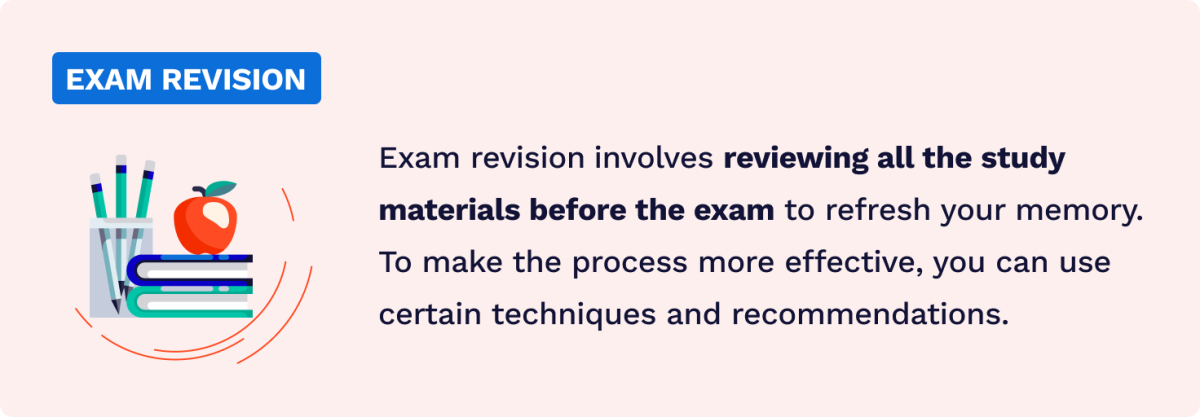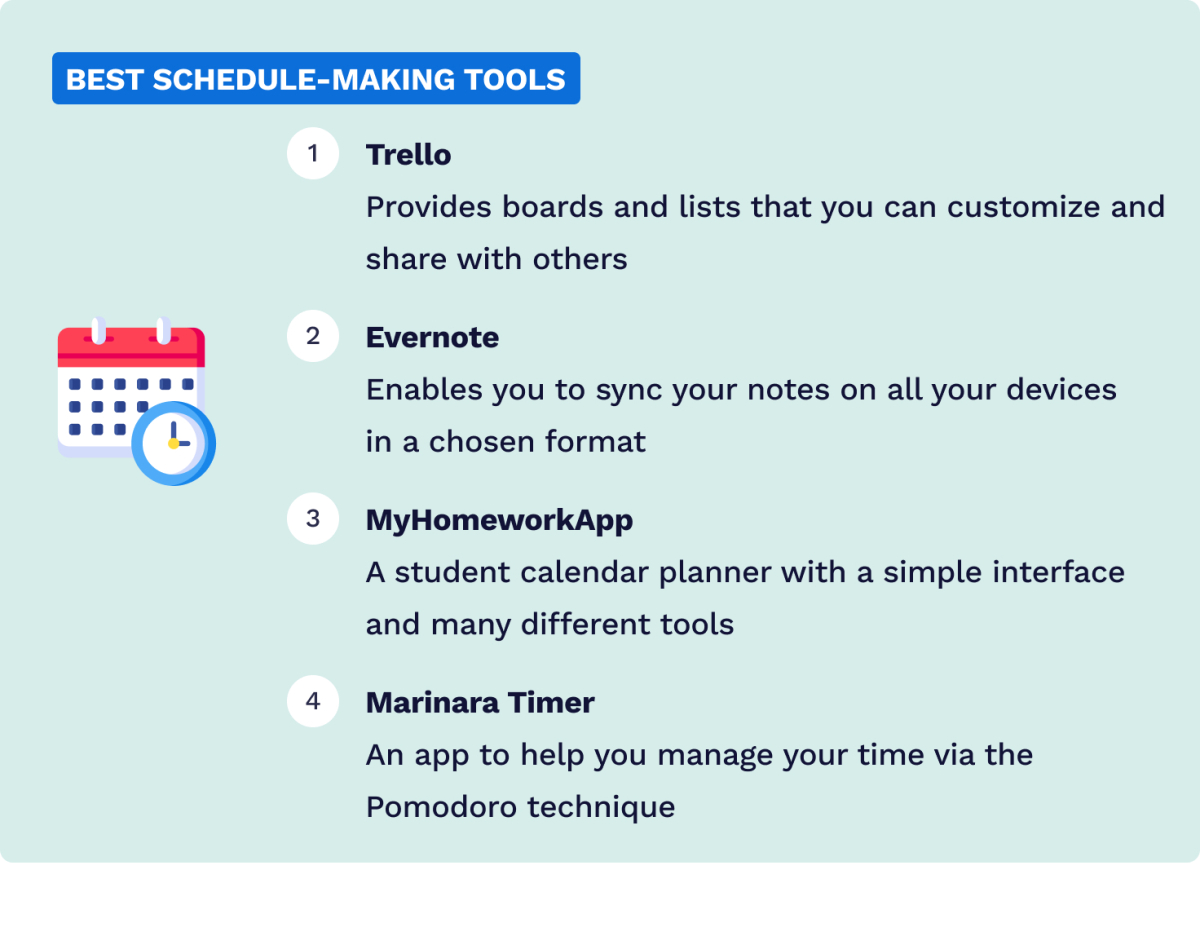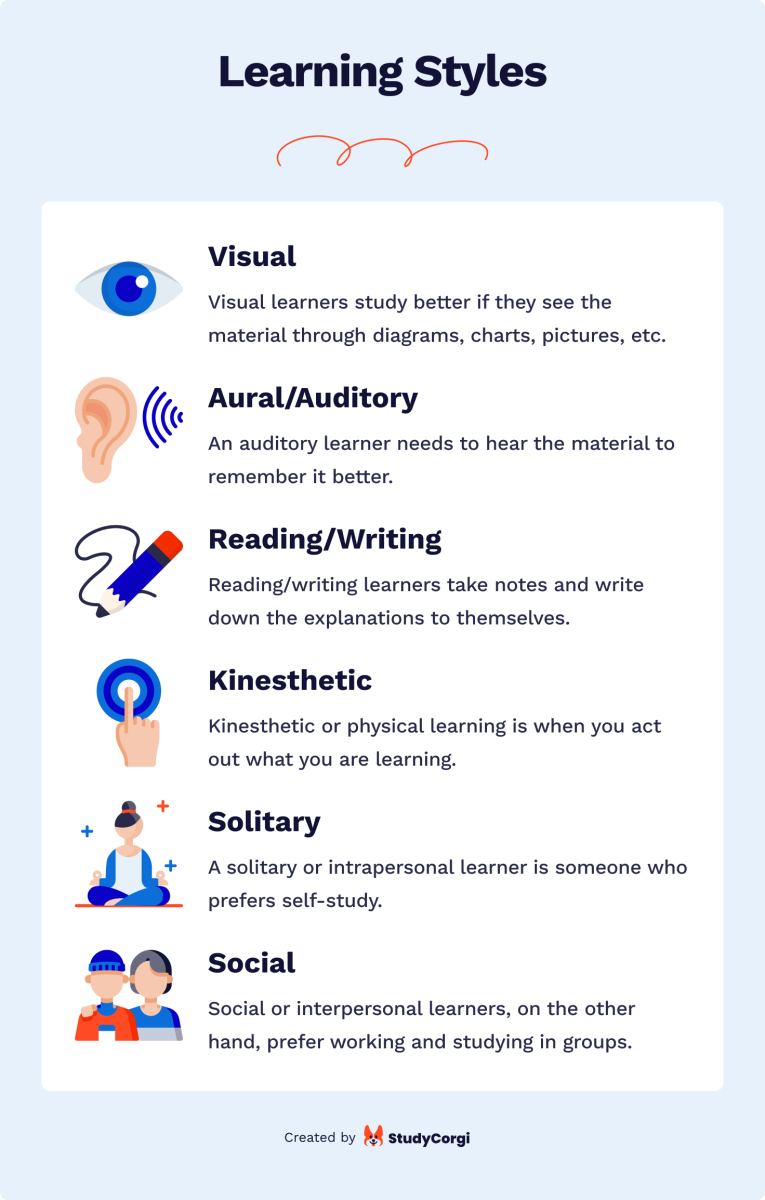The most stressful time in a university or high school student’s life is definitely the exams period. This is the time when students try to figure out how to revise effectively in a short time.
Exam revision involves reviewing all the study materials again to refresh your memory. We have gathered several techniques and recommendations to help you revise for your exams efficiently.

In this article, you’ll find:
- 6 exam revision techniques
- 23 revision tips
Learn how to revise for exams and how to make a revision timetable with our guide. To help yourself in this process, check out some essay examples for free on our website, too. Look for works on the same subject and topic to get additional information or maybe gain some insights.
🚦 Revising for Exams: How to Start
So, your exam period is coming! How do you start the revision process?
The best way to revise for exams is to prepare thoroughly. If you prepare for your revision well, you’ll have an easier time remembering the material during the exam itself. Here’s some advice on how to revise correctly and efficiently.
Start Early
It is crucial to start preparing as soon as possible. Many students struggle with their exam revision because they don’t start studying until the last minute.
Here are some benefits of starting your revision early.
- You can keep your stress to a minimum. When we’re pressed for time, we often become anxious. So, in order to prepare for your exams without getting too stressed out, make sure to start studying a few weeks before the exam.
- You can boost your grades. By preparing for your exams early, you can deepen your knowledge of the subject matter and improve your grades on your current assignments.
- You have more time to identify your weaknesses. Knowing what your weak points are early on gives you more time to work on them.
- You can review past exam papers. If you have more time to study past exam papers, you can begin to predict what your future exams will be like. Sometimes the structure of the exam is more important than the actual questions.
Organize Your Study Space
Organizing your study space is more crucial than it may seem. Here are some tips for tidying your workspace and preparing it for your exam revision.
If you want to learn more about organizing your study space, you are welcome to look at this infographic on the topic.
📅 Revision Timetable: How to Make a Successful Plan
A timetable can help you manage your time effectively. You’ll also be able to decide which topic or subject you need to spend the most time on.
Moreover, a lot of students tend to forget about taking a rest while revising for exams. Having a timetable can not only manage your time for studying but help you put aside time for relaxation.
Decide Where You’ll Make Your Timetable
Think about what kind of timetable is most convenient for you. Some people prefer creating one on Excel or on Google Calendar, while others prefer writing their calendar down by hand. However, there are also many different apps you can use.

Our favorites are the following:
- Trello
Trello provides boards and lists that you can customize and share with others. It is very convenient, but doesn’t have a lot of storage, and doesn’t handle big projects well. - Evernote
With Evernote, you can sync your notes on all your devices. You can choose from several different formats, including text, audio, photos, videos, and more. However, the app has limited storage and its plans are expensive. - myHomework Student Planner
This is a student calendar planner where you can track all of your deadlines. It has a simple interface and many different tools. It also has the option to remind you of your deadlines.
You can also try different apps to help you manage your time via the Pomodoro technique. Marinara Timer is a timer that organizes your study and rest periods.
Set Your Study Goals
After you make your calendar, it is time to set your goals.
- Start by getting a full picture of your time limit and writing down all the exam dates.
- Then, you should think realistically about what grades you can get in each of your subjects and what you can do to boost them.
- Finally, identify your strengths and weaknesses in the subject you’ll be studying. Based on that, you can set your revision priorities.
Break Down Your Goals
Big goals can be hard to achieve. A good way to reach your study goals is to break them into smaller parts.
Let’s say your study goal is to get an A on your Literature exam in college. To do so, you need to break down the process into smaller steps. For example, read the required chapters, analyze the reading material, write down the possible exam questions, etc. It is easier to focus on these smaller steps. Moreover, you’ll be able to watch your progress little by little.
We suggest that you make a to-do list for each of your subjects. Then, estimate the amount of time you need to spend on the steps to achieve the overall goal.
Timetable Your Studies
Now it’s time to make your schedule.
You can start by writing down your everyday activities that have nothing to do with your academic work and exam revision.
Then, identify the empty spots and decide which will function as your revision time.
When preparing for the exams, it is better not to stick to one subject for a long time. Instead, aim to alternate them every so often.
Moreover, it is crucial to switch between your favorite topics to your least favorite ones so that you won’t have to deal with the most difficult material at the end.
Don’t forget to give yourself a day off. For example, choose one day not to study at all. Giving yourself a break can help you avoid burnout.
Stick To the Plan!
Now, all you have to do is stick to your plan. Making a schedule is one of the most crucial steps of exam revision. So, make sure to take your time and prepare it thoroughly.
Remember to follow your schedule and give yourself breaks.
📝 Revision Techniques: Which to Use
Here are six techniques for efficient revision. Choose the best ones for you based on your learning style. You can take a quiz to find out what kind of learner you are.

- Visual learning style. As you may have guessed from its name, a visual learner is someone who learns better if they see the material through diagrams, charts, pictures, etc.
- Aural/auditory learning style. On the other hand, an auditory learner needs to hear the material to learn it better. They usually pay more attention during lectures.
- Reading/writing learning style. Reading/writing learners are the ones who take notes and write down the explanations to themselves.
- Kinesthetic learning style. Kinesthetic or physical learning is when you act out what you are learning. If you think that doing something yourself is more efficient than learning the theory, you are probably a kinesthetic learner.
- Solitary learning style. A solitary or intrapersonal learner is someone who prefers self-study. They like to study in quiet places and generally avoid crowds.
- Social learning style. Social or interpersonal learners, on the other hand, prefer working and studying in groups. They like to discuss and connect with others to achieve better results.
Technique #1: Summarize Effectively
This technique is usually helpful for reading/writing learners. The idea is to summarize the material in order to deepen your understanding of it.
Here are a few steps that can help you summarize effectively.
- Read the material. Make sure to read it more than once. Scan the text first, then read it carefully. Finally, reread the text to see if you understand it well.
- Divide it into smaller parts. Break the text down into smaller parts to make it easier to follow.
- Find the key point in each section. After you break down the text, identify the key points of each part. Pay attention to thesis statements and topic sentences.
- Write your summary. Now that you have identified the essential points, it’s time to summarize them in your own words. This step will help you to absorb the information.
- Double-check your summary. Now, read your summary and make sure you didn’t miss any crucial information.
Technique #2: Make Flashcards
Reading/writing learners might find flashcards useful for their revision too.
You can make your flashcards by hand or use an app. Two websites you can use are:
Why are flashcards efficient?
- They allow you to choose which material to study.
- You have to evaluate your knowledge of the subject before creating a flashcard.
- By writing out the material on the flashcard, you strengthen your memory.
- Using flashcards makes you go through the same information several times, which solidifies your information recall.
How do you create a good flashcard?
- Make sure to have a term or a question on one side and a definition or answer on another.
- Keep it short and precise.
- You can categorize your flashcards by making them in different colors (one color = one category).
Technique #3: Draw Pictures
Drawing pictures is a good option for visual learners. According to Current Directions in Psychological Science, drawing pictures while studying strengthens memory recall. You may think that you can’t use this technique if you are not creative or not a talented artist. However, according to the research, the quality of your drawing doesn’t matter.
Drawing causes better recognition than writing because of the number of details involved in the process.
Try doodling while memorizing new vocabulary or terms for your exams instead of writing them down.
Technique #4: Try Mind Mapping
Mind mapping is another great option for visual learners.
This technique involves creating a diagram with pictures and lines to structure the information.
The best way for students to create a mind map is to make it big and bright. Try using capital letters and different colors for different sections. Make sure to use textbooks, guides, and books as resources for your map.
You can create one yourself or use an app.
Canva provides a mind map maker with templates. With this app, you can:
- Customize your map
- Use different elements such as shapes, lines, icons, etc.
- Color code your map using the color palette
- Download and share your mind map
After you finish your map, we recommend printing it out and hanging it in your room, where you can see it and review it regularly.
Technique #5: Test Yourself
Solitary learners can try self-testing while revising for exams.
- You can use online tests or prepare questions for yourself in advance.
- Another option is to summarize everything you’ve learned. Read the material, then try to write down as much as you can.
This process is great to strengthen your memory recall. If you can remember what you’ve learned, you will be able to use it in the future as well.
Testing yourself can also help you to identify your weak spots. Don’t be disappointed if you make mistakes while preparing yourself. Thanks to these mistakes, you can learn more and do better on the actual exam.
Technique #6: Teach Someone
This method is great for social and aural/auditory learners.
Teaching someone is a very effective way to learn something yourself.
Try to find someone who doesn’t know much about the topic you’re studying and explain it to them as simply as possible.
Another way you can follow this technique is to find a study partner. You can divide the topics between the two of you and explain them to each other. This is an efficient way to revise for your exams that can also save you a lot of time.
Even if there is no one to study with, you can say the material out loud. The act of repeating the material out loud can help solidify it in your memory.
🙌 More Exam Revision Tips
So far, we have reviewed the main revision techniques. Let’s now take a look at some tips and tricks that can make your exam revision easier. These also include psychological tricks that will help you feel better and optimize the entire process.
👨🎓️ Exam-Day Tips
The exam day has finally arrived! Here are some tips you can use so that all your revision won’t be in vain.
Check the Time and Place Once Again
As simple as it sounds, make sure to double-check the time and venue. Manage your time so you don’t arrive late, and plan your route to the exam location in advance.
Pack Your Things in Advance
Another simple thing to do is pack your bag in advance. Make sure you have an extra pen and pencil. Pack your things depending on which exam you will take. You may need a calculator or a dictionary, so remember to check your bag before each of your exams.
Sleep Well & Wake up Early
Manage your time so that you don’t stay up all night before the exam. Set your alarm early to have time for breakfast and get to the venue with no rush. Being in a hurry might make you nervous, and you don’t need that before your exam.
Eat Well & Stay Hydrated
It is beneficial to eat slow-release carbohydrates before the exam. Try having oats, apples, or whole grain bread for breakfast.
Don’t forget to stay hydrated too. Dehydration can make you less concentrated and cause headaches. You can usually have a water bottle with you during the exam, so don’t forget to bring it.
Learn more on the topic in an article on brain food for students!
Review Your Preparation Process After the Exam
Your exam is over, so now it’s time to reflect. Ask yourself these questions:
- Which revision methods were efficient? Which ones were not?
- What would you change about your performance on the exam?
By answering these questions, you can identify which methods worked for you and apply this knowledge to your next exam revision.
📊 23 Exam Revision Tips: Infographic
Here you’ll find an infographic with the revision tips and techniques we’ve outlined for you. Learn how to track your progress, reward yourself, find time for relaxation, look for support, and stay calm during the stressful exam revision period.

That’s it for our revision tips and techniques! We hope you’ve found this article helpful. What revision techniques do you use? Do you have any lifehacks you can share? Let us know in the comments below, and good luck with your exams!
